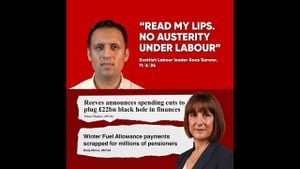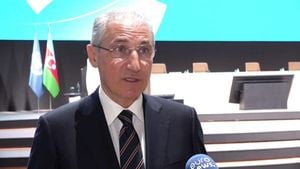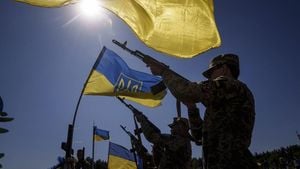Activists Suffer Heavy Sentences for Pro-Democracy Actions
HONG KONG — A heartbreaking chapter for Hong Kong's pro-democracy movement unfolded this past Tuesday, as 45 prominent activists were sentenced to prison terms ranging from four to ten years under one of the most controversial laws imposed by Beijing. This law, enacted to suppress the pro-democracy movement, has prompted both domestic and international outrage.
The group, often referred to as the "Hong Kong 47," faced charges stemming from their roles in organizing what officials deemed an "unofficial primary election" back in July 2020. This electoral event, which attracted over 610,000 participants, aimed to rally pro-democracy candidates to secure majority control within Hong Kong's Legislative Council (LegCo). By doing so, the advocates hoped to pressure the local government to address citizens' demands for increased accountability among law enforcement and expanded democratic rights.
Despite their hopes, local authorities swiftly labeled the unofficial primary as illegal, arguing it sought to undermine the government and provoke instability. The long-awaited sentencing delivered shockwaves throughout the local and international communities, illustrating the drastic turn of events following widespread protests and agitation for reform, particularly during the tumultuous climate of 2019.
Benny Tai, the renowned legal scholar and organizer of the primary, received the longest sentence, totaling a decade behind bars. He has often been described as the face of the pro-democracy efforts, even co-founding the Occupy Central movement back in 2014, aimed at ushering fair elections for the city.
The court's ruling stated how the defendants’ actions presented clear signs of “conspiracy to commit subversion.” The judges asserted the activists' plans to carry out their electoral ambitions posed risks of creating what they termed as “constitutional crises.” Some defendants argued they had genuinely believed their actions were lawful at the time, but the court found their claims unconvincing.
Among those jailed, former student leader Joshua Wong faced four years and eight months for his role. Wong, who emerged as one of Hong Kong’s most recognizable pro-democracy figures at the tender age of 14, has been steadfastly vocal against the authoritarian trends under China’s rule. His defiance has garnered immense public attention, and he has been incarcerated multiple times, consistently standing firm against the oppressive measures implemented by the state.
Yet the sentencing did not just stir anger among activists and supporters; it raised alarms among foreign governments and rights organizations. The U.S. government condemned the sentencing, emphasizing the defendants were "aggressively prosecuted and jailed for peacefully participating in normal political activity protected under Hong Kong’s Basic Law"—a nod to basic human rights guaranteed under the territory’s mini-constitution.
Criticism also flowed from Australian officials, with Foreign Minister Penny Wong expressing grave concern for Australian citizen Gordon Ng, who was alongside the 45 activists. Wong highlighted how the continuing use of broad national security legislation poses real threats to freedom within Hong Kong.
The international community—a coalition of human rights advocates, foreign diplomats, and political figures—rallied for the release of the convicted activists, highlighting the chilling effect on civil liberties. The situation culminated with remarks from Chris Patten, the last British governor of Hong Kong. He condemned the sentences as an affront to people's rights and urged the British government to take notice of the proceedings.
On the other hand, Chinese authorities maintained their position on the national security law, framing it as necessary for Hong Kong's stability. They condemned outside interference, emphasizing how the law helps to maintain order after what they described as “unlawful” actions undertaken by the activists.
Pro-democracy sentiment truly remains powerful among the populace, yet the overall suppression has transformed the social and political landscapes within the region. Observers noted the sentencing serves as yet another oppressive string to the broader narrative aiming to silence any remnants of dissent since the massive pro-democracy protests occurred. The once-vibrant movements, which filled Hong Kong's streets with calls for change, seem increasingly hamstrung by the firm grip of the state.
Outside the court, families endured the weight of the sentences, processing the fallout of the draconian measures against their loved ones. Many supporters rallied outside, carrying banners, chanting slogans, and expressing their unwavering solidarity. For many of these activists, the sentiment of loss and abandonment was palpable, yet the hope of pushing back against state oppression remains alive.
These recent events—a harsh reminder of how swiftly the balance of freedom can tip—are being watched closely worldwide. The pro-democracy activism birthed from Hong Kong’s unique political history stands at the forefront of this struggle, and fate surrounds those who stepped up to champion democracy and civil rights within the region.
While the fate of these 45 activists hangs precariously with heavy sentences, their commitment to nurturing democracy, human rights, and freedom continues to echo within the hearts of many across Hong Kong and beyond. Observers remain eager to see how these developments will shape the future of civil liberties not only within Hong Kong but throughout nations where governments similarly constrict freedom of expression and assembly.



